

Boredom, Zombies, & Economic Collapse - John Taylor Gatto - GOOD STUFF!! 14 Principles of Elite, Private Schools - John Taylor Gatto - MUST SEE!! What's an Elite Education? - Famous Teacher Explains - John Taylor Gatto. Classics and the Western Canon - General: What is a classic; what is the Western canon? (showing 1-50 of 99) David Brooks Columns Are Required Reading for the Yale Course Taught by David Brooks. Harold Bloom Creates a Massive List of Works in The "Western Canon": Read Many of the Books Free Online. I have little desire to rehash the politics, but the facts are plain: by the time I arrived in college as an undergraduate English major in the mid-90s, the idea of the “Western Canon” as a container of—in the words of a famous hymn—“all that’s good, and great, and true” was seriously on the wane, to put it mildly.
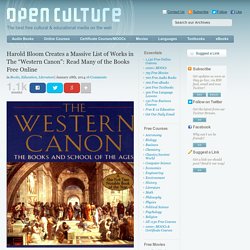
And in many quarters of academia, mention of the name of Yale literary critic Harold Bloom provoked, at the very least, a raised eyebrow and pointed silence. Bloom’s reputation perhaps unfairly fell victim to the so-called “Canon Wars,” likely at times because of a misidentification with political philosopher Allan Bloom. That Bloom was himself no ideologue, writes Jim Sleeper; he was a close friend of Saul Bellow and “an eccentric interpreter of Enlightenment thought who led an Epicurean, quietly gay life.”
The Western Canon: The Books and School of the Ages. 1994 book by Harold Bloom.
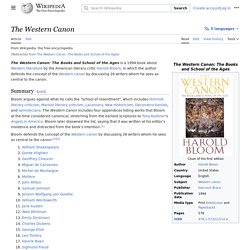
Race at Yale: suggested reading list - The Yale Herald. Given the events on campus, the Herald has reached out to Yale students and professors to share their personal reading recommendations on how to help get a better grasp of recent racial discourse on campus.
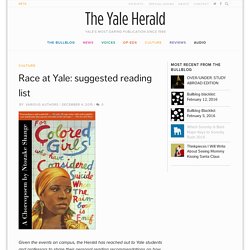
Read away! Professor Vanessa Agard-Jones “Women of Colour as Diversity Workers” and On Being Included: Racism and Diversity in Institutional Life by Sara Ahmed Sara Ahmed’s work is particularly instructive for us in this moment. Her blog post here, on “Women of Colour as Diversity Workers,” is a great introduction to the arguments she makes in On Being Included: Racism and Diversity in Institutional Life. “NHI: An Open Letter to My Colleagues” by Sylvia Wynter While it was written in the early 1990s, Sylvia Wynter’s “NHI: An Open Letter to My Colleagues” is uncannily current. A Yale Winter Reading List - Yale University Press London BlogYale University Press London Blog. Whether your winter pursuits include trips to the ballet, winter wine tasting or some fireside garden planning in anticipation of spring, our winter reading list is devised to inspire you.
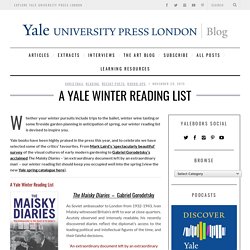
Yale books have been highly praised in the press this year, and to celebrate we have selected some of the critics’ favourites. From Mark Laird’s ‘spectacularly beautiful’ survey of the visual cultures of early modern gardening to Gabriel Gorodetsky’s acclaimed The Maisky Diaries – ‘an extraordinary document left by an extraordinary man’ – our winter reading list should keep you occupied well into the spring (view the new Yale spring catalogue here). A Yale Winter Reading List The Maisky Diaries – Gabriel Gorodetsky As Soviet ambassador to London from 1932-1943, Ivan Maisky witnessed Britain’s drift to war at close quarters.
‘An extraordinary document left by an extraordinary man.’ — Andy McSmith, Independent Latest Readings – Clive James Eternity’s Sunrise – Leo Damrosch. Berkeley Summer Reading. Department of Political Science. POLITICAL ECONOMY READING LIST Department of Political Science, Yale University 2015 In order to prepare for certification in the field of Political Economy, students should take PLSC 517 and at least two other courses from among the ten or so that are offered in the department.
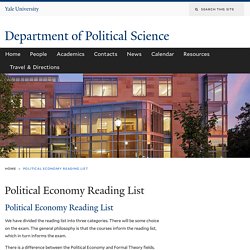
We highly recommend that students preparing for certification in this field take the exam, rather than the paper option. We have divided the reading list into eight categories. There will be some choice on the exam. The general philosophy is that the courses inform the reading list, which in turn informs the exam. There is a difference between the Political Economy and Formal Theory fields. 1. 1.1 Political Competition Becker, Gary S. 1983. 1.2 Distribution Austen-Smith, David, and Michael Wallerstein. 2006. 2.
Acemoglu, Daron, and James A. 3. Alt, James E., and Michael Gilligan. 1994. Comparative Politics Reading List. COMPARATIVE POLITICS READING LISTDepartment of Political Science, Yale UniversityFebruary 2015 Methodology Achen, Chris. (2005).
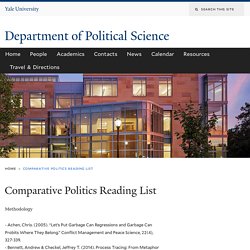
Let’s Put Garbage Can Regressions and Garbage Can Probits Where They Belong. Conflict Management and Peace Science, 22(4), 327-339.Bennett, Andrew & Checkel, Jeffrey T. (2014). Process Tracing: From Metaphor to Analytic Tool. Comparative Politics Reading List. Department of Political Science. AMERICAN POLITICS READING LIST Department of Political Science, Yale University (Updated Spring 2012) This list should not be understood as a canon that must be internalized to provide a foundation in American politics but as a guide to important issues and controversies in the field.
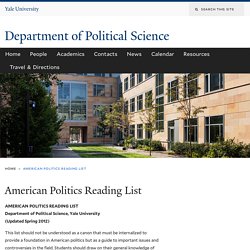
Students should draw on their general knowledge of American politics, as well as courses on American Politics and other relevant areas. Starred readings are particularly important, instructive, and/or foundational. Reading this subset of the list is not sufficient, however, for passage of the exam. American Political Development and Thought B. B. R. D. R. Leviathan, by Thomas Hobbes : chapter9. THERE are of are of knowledge two kinds, whereof one is knowledge of fact; the other, knowledge of the consequence of one affirmation to another.
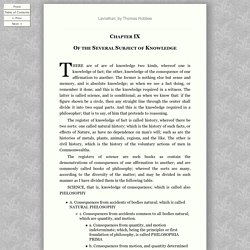
The former is nothing else but sense and memory, and is absolute knowledge; as when we see a fact doing, or remember it done; and this is the knowledge required in a witness. The latter is called science, and is conditional; as when we know that: if the figure shown be a circle, then any straight line through the center shall divide it into two equal parts.
What's an Elite Education? - Famous Teacher Explains - John Taylor Gatto. The Six-Lesson Schoolteacher, by John Taylor Gatto. Call me Mr.
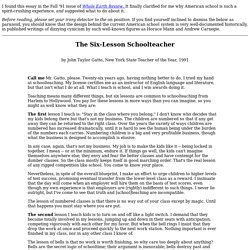
Gatto, please. Twenty-six years ago, having nothing better to do, I tried my hand at schoolteaching. My license certifies me as an instructor of English language and literature, but that isn't what I do at all. What I teach is school, and I win awards doing it. Teaching means many different things, but six lessons are common to schoolteaching from Harlem to Hollywood. The first lesson I teach is: "Stay in the class where you belong. "